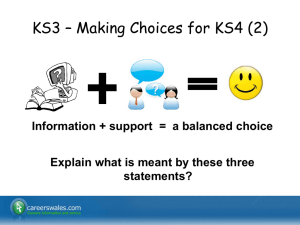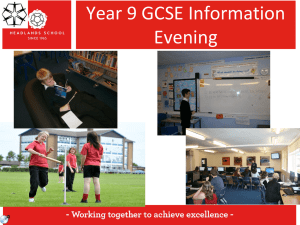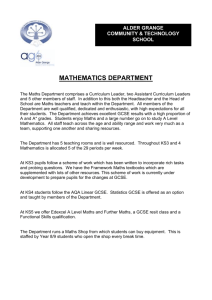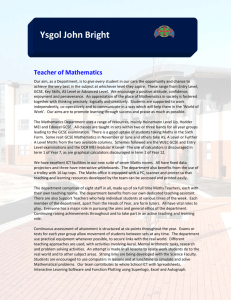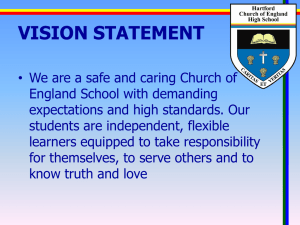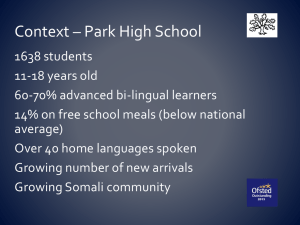Year 9 Preparing for Success Evening
advertisement
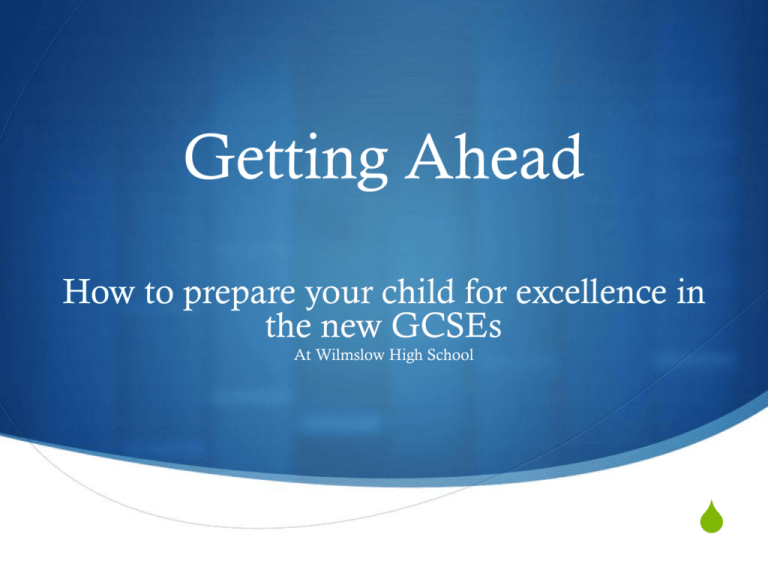
Getting Ahead How to prepare your child for excellence in the new GCSEs At Wilmslow High School S How are the new GCSEs different? S Harder content S Terminal exams – more to remember and exam-based S No re-sits – students need to get it right first time S New grading: 9-1 with 9 as a harder grade to achieve than A* S Focus on literacy S No separate KS3/ KS4 – students are on a flight path to GCSE from Year 7 A recommended Baccalaureate route Core E Baccalaureate subjects Facilitating Subjects Mathematics English Language English Literature Any 3 from the following options: Physics Biology Chemistry Core Science Additional Science Computer Science History Geography French German Spanish Any 3 subjects Whole Curriculum For breadth Any 3 subjectss from the E Bacc. list or other options PE PHSCE RE What does excellence in the new GCSEs require? S Practice hours: hard work in lessons and for homework S Struggle: 80% learning S Literacy skills: reading and extended writing S Ability to memorise content S Ability to apply knowledge to new contexts and abstract thinking S Tenacity How will we keep you informed? S Your child’s work: i. Assessments to prepare students for GCSE ii. Clear feedback from teachers S Contact through your child’s planner S Progress based reporting S Appropriate grouping to ensure that your child is getting the right level of support and challenge Find out more S Telegraph article GCSE reforms: explained S 5 Parenting Strategies to Develop a Growth Mindset This is aimed at primary level but has some useful tips that can be applied to teenagers S A scholarly article on the link between learning knowledge and expertise: Inflexible Knowledge: The First Step to Expertise How will English GCSE be different? S No coursework – exams in Language and Literature after 2 years S Literature exams will be ‘closed book’ – this means that students will not be allowed to have the texts with them S There will be no tiered entry – all students will sit the same exams S Language exams involve responding to sources including C19th texts and varied writing tasks What does excellence look like in English? S Accuracy/precision in written work S Increased focus on extended writing tasks – exploring ideas in detail S Increased importance of spelling, punctuation and grammar S Reading: all students should have an extra-curricular reading book on them at all times S At least 2-3 hours independent reading per week S Organisation: ensuring that the correct equipment/books are brought to lessons KS3 Assessment S Working towards ‘Mastery’ in different skills key to excellence at GCSE S Reading skills: Writing skills: 1)Understanding 1)Writer’s craft 2)Inference 2) Organisation 3)Language analysis 3)Vocabulary 4) Contextual considerations 4) Structure How you can help... S Support your child’s reading: all students must develop the tenacity to complete longer texts S Spelling: we will put lists of frequently misspelt words on the VLE. Feel free to conduct spelling tests at home! S Literacy activities are available on the VLE S Students will have a literacy booklet to revise from in school – feel free to test their knowledge at home! S Encourage your child to take pride in their work. Find out more S WHS recommended reading list: available to students from the LRC and to all on the VLE S BBC bitesize website S Curriculum Digest S IGE – free app for phones to help with grammar How will Maths GCSE be different? S It will be more demanding: S Increased volume S Increased demand S Increased exam time S Fewer marks for lower grades, more marks for higher grades S Greater emphasis on problem solving & reasoning S Fewer formulae given How will Maths GCSE be different? New grades 1 Current G GCSE Current Foundation New Foundation Current Higher New Higher 4 F 50% E 25% 50% D 9 5 C B A A* 25% 50% 40% 35% 50% Set 4 Grades 25% 50% What does excellence look like in Maths? S Entering the maths classroom mentally and physically ‘prepared to work’ S Being confident and competent in basic maths skills. S Completing homework to the best of their ability and handing it in ‘on time’. S Asking questions. S Practise, Practise, Practise! Find out more S www.edexcel.com/maths S Many differing resources on the VLE S www.mymaths.co.uk S Nrich.maths.org S Revision guide S Ask your teacher S Mr Hughes & Mrs Mackintosh available each lunchtime in the maths atrium. How will Science GCSE be different? S Terminal examinations: at the end of Year 11 S Grades will change from letters to numbers, ranging from 9- 1 S No controlled assessment (coursework) S More challenging, demanding content S Practical work is placed at the heart of learning What does excellence look like in Science? S The expectation by all that you work hard in lessons and at home S You expect to be challenged by scientific concepts S You are able to apply those scientific concepts S Your written work shows care, thought, insight and dialogue! S Concepts and theories are tested through practical experiences in lessons How will you know if Triple Science is the right option? S If you relish the idea of spending 9 periods a week in science lessons S If you get out of bed and think ‘great, I have science today’ S If you want to discuss such phenomena as why ice floats on water when it’s a solid? S If you are consistently producing work that is at or beyond a projected GCSE B grade Find out more S Speak with Mr G Jones initially S Speak with your science teacher S Read the KS4 Course Choice booklet carefully when it is published S Talk as a family about your choices S Visit our LRC to read our wide variety of periodicals S ‘Whole Education’ S PE – healthy body….healthy Preparing for Excellence mind S PHSCE – personal development S Responsibility and community: leadership and volunteering S Challenge: D of E S Friendships/skills….‘X-tra’ S Enrich and experience: educational visits S Wellbeing: The Hub S Work and life ready…stepping stone How do you achieve excellence? S Everyone is different S Do your best S Make the most of your opportunities S Take risks S Aspirations: aim high S Passion and drive S Don’t give up S Listen to advice/feedback S Learn from role models S Believe in yourself Do you have a ‘can do’ mindset? S Mindset matters S Fixed mindset – intelligence can’t improve S Growth mindset – intelligence is a quality that can be developed S Brain is a muscle….make it stronger S 3 steps to developing a growth mindset: 1. Learn, learn and learn 2. Understand hard work is key 3. Accept setbacks Fixed vs Growth…which are you? Year 12 reflections: ‘top tips’ Option process: S “Think ahead” S “Don’t choose based on teachers” S “Choose a good mixture” S “Don’t choose with your mates” S “Find out what’s involved” S “Talk about it……don’t do it on your own” More student ‘top tips’ S “Don’t wait until Year 11” S “Get a routine” S “Put the phone away!” S “Worth working hard….but have a life” S “Get organised!” S “You need sleep” S “Don’t be scared to ask for help” S “Don’t look back with regret….can’t do it again” S “Get involved in other stuff….more to school than exams” Find out more S Mindset: how you can fulfil your potential (Carol Dweck) S Outliers: the science of success (Malcolm Gladwell) S The genius in us all: why everything you’ve been told aout genetics, talent and IQ is wrong (David Shenk) S Drive: the surprising truth about what motivates us (Daniel Pink TED Talk) S Bounce: the myth of talent and the power of practice (Matthew Syed) What can you do to help your child? S Practice hours: Ensure that your child is putting in the homework S S S S S hours Struggle: Check that your child is in the ‘struggle zone’ with their work and encourage them to do it for themselves Literacy skills: reading and extended writing: the more reading, writing and vocabulary work your child is doing the better Ability to memorise content: Attend our Parental Learning Evening on developing memory capacity Ability to apply knowledge to new contexts and abstract thinking: Encourage your child to use a Thinking Journal to connect learning Tenacity: Encourage your child to keep going – organisation is vital – they need to be punctual and prepared for learning What if you have any concerns about your child’s progress S Speak to the appropriate person tonight S Contact us at the school: Form tutor ii. Head of House iii. Subject Teacher iv. Subject CTL v. SENCO vi. Deputy Headteacher i. What next? S Parent Voice: What else do you need from us? S Aspirations Programme S Parent Learning Evening on building memory capacity S Options Process will begin… S High Notes
